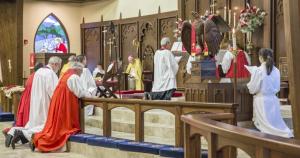 Bishops and Deacons – 1 Timothy 3:1-13
Bishops and Deacons – 1 Timothy 3:1-13
St. Paul continues in chapter 3 with his teaching on authority in the church, only this time he is addressing bishops and deacons in particular. Like so much of Scripture, if we really believed what God has commanded us, I wonder how it might revolutionize our lives and our churches.
As we look at the qualifications for bishops and deacons, we should keep in mind two things: the standards for being a leader in God’s holy Church are high ones, and even though these standards apply especially to church leaders, they are godly wisdom for all of us.
A bishop or overseer must be blameless. Paul doesn’t mean sinless here or else there would be no bishops or overseers! But he does mean that the man must be without obvious sins or ones that would in any obvious way obstruct his ministry. We may debate exactly what Paul means, but surely this is a high standard we should require for our church leaders.
A bishop should be able to teach. He must be holy, but he must also “know his stuff.” He must be one who has first been teachable and a good student, but he must also know the Bible and his people so well that he can effectively communicate the apostolic teaching to them. This apostolic teaching is completely tied up with the holiness of the bishop, for so much of what he is teaching is God’s holy commandments. The bishop must be the living incarnation of God’s holiness, or else his teaching will be hypocritical.
A bishop must not be greedy for money. In most Reformed Episcopal churches the bishops and priests are not paid very well, so we don’t see many men who are in it for the good pay. But that doesn’t mean that some of us may not be greedy and desire more than what we need. In larger churches, both in terms of larger local churches and in terms of “denominations,” I know that many times men are looking for the “next step up.” Sometimes there is not a sense of being married to a particular parish and a particular people. Other times, when a church is prospering materially and numerically, it is very possible for it to go to a man’s head.
It is especially unwise for the church to put a man in a position of authority when he has not had time to prove faithful with lesser things. He must not be a novice who appears to make up for his ignorance and inexperience with his zeal. Once he has proven that the seed of faith has taken deep root and produced fruit, then he may be considered. Some churches put their new recruits out on the front line of spiritual warfare before they have even been through boot camp.
One of the most important qualifications for a church leader (bishops and deacons) is that he is able to rule his own house. In keeping with the kingdom principle that if you prove faithful with a few small things God will entrust to you the stewardship of larger, more important things, a man must first rule his own household well before he is to be considered a candidate to be a bishop. As Paul says, if a man can’t rule his own household, which he is in every day and which is his own flesh and blood, why would anyone think he would rule God’s household well?
This principle is so important, and it is so important that we truly hold our church leaders to it, that I want to consider it a little more. It is a very personal thing to me, as one ordained to lead a local church. I remember when my wife and I were dating that she told me that for years she didn’t want to marry either a doctor or a pastor because they might not be as much of a presence in the household as they ought to be. I vowed to her that I would be, in large part because of I Timothy 3. If I ever stop being faithful at home, then I need to reconsider if I am still to serve as a pastor.
Too many church leaders think that it is somehow O.K. to let the wife take care of the household and children because their work at the church is so important. St. Paul connects the two: you can’t have a faithful church leader who is not a faithful household leader, though it might appear possible from the outside. This qualification is so important that it is mentioned for both bishops and deacons. In keeping with this principle, the deacons (verse 10) must first be tested, for as Paul says elsewhere, the church is to lay hands on no man suddenly. The requirements even for deacon (an ordained office in the early church) are very high in God’s household.
Notice, therefore, the qualifications for church leadership that Paul doesn’t mention. You don’t have to be charismatic or an extrovert; you don’t have to be a good CEO, a good PR person, or have an MBA; and you don’t have to be a skilled politician or toastmaster.
What is clear about all of the requirements for church leadership is that there is one overriding consideration – and it applies as well to lay leaders who aren’t ordained and to household leaders. The one essential qualification for a Christian leader is holiness – to be holy as God is holy, and to keep His holy commandments. We should hold our Christian leaders to the standard of holiness, as well as ourselves.
Show me a man who is holy, and I will show you a good potential candidate for church leadership or Christian leadership of any kind.
If you want to be great in the kingdom of God, therefore, be holy, and learn to be the servant of all.
Now what if you apply the same standards to yourself? Though you may not have been called by God to be a leader in the church, Paul’s list is still an excellent way of examining yourself with regard to holiness. Whatever your part in God’s kingdom, seek first the kingdom of God and His righteousness, and all of these other things, including church leadership if it pleases God, will be added unto you.
Prayer: Almighty God, who has ordained holy men to have oversight of your holy Church, I ask that you bless your Church by giving her godly leaders. Help me and others to support and encourage those who exercise godly leadership and to work to expect it in my local church. As I consider your holy expectations, help me to hear what you would have me to hear in my own life about the degree of leadership you have entrusted to me. Amen.
Points for Meditation:
- Reflect on how your church discerns its leaders and ordains them. How well does your church do in expecting its leaders to be holy and qualified?
- Is God leading you to a greater position of stewardship in His kingdom? If so, what hindrances or obstacles remain to God using you? Have you adequately considered God’s call to holiness as a prerequisite?
Resolution: I resolve to review Paul’s list for spiritual leadership in terms of my own life today.
Consecration of Bishop Walter Banek – used by permission of The Reformed Episcopal Church











